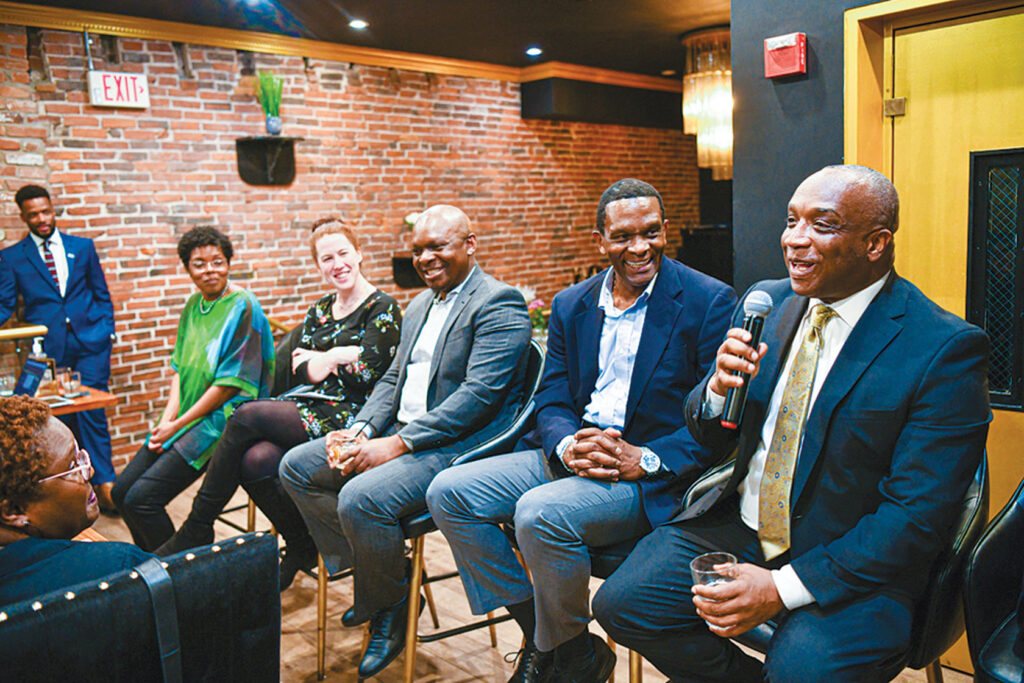Black economic group fights disparities
Entrepreneurs of color focus on equity

Following the 2015 Boston Federal Reserve report, “The Color of Wealth,” which identified major racial wealth gaps in Boston, several Black businesses owners in Massachusetts joined together to create the Black Economic Council of Massachusetts.
The organization, which is often called BECMA, works in policy and advocacy as well as running programs to help Black businesses owners and entrepreneurs. BECMA now supports members in 51 industries statewide, according to its the 2022 impact report released in April.
Almost 10 years after the Federal Reserve report was released, BECMA continues to work to close the racial wealth gap across Massachusetts. President and CEO Nicole Obi called the work BECMA does “an investment,” citing a report from the Massachusetts Taxpayers Foundation that estimated closing the racial wealth gap could grow the Massachusetts economy by $25 billion.
BECMA members told the Banner services provided by the organization have allowed them to better sustain and grow their businesses.
Shironda White, co-founder and CEO of Cupcake Therapy, said that sessions at BECMA’s Mass Black Expo — an annual three-day event offering resources and purchasing opportunities to Black-owned businesses, entrepreneurs and professionals — have provided important information that has allowed her to grow her business.
“Being able to make those connections, being able to get what we need as a business in terms of information on things like becoming a certified minority-owned business, a woman-owned business, about funding options for our business, a lot of different things that they do to address entrepreneurship in the Black community, those sessions have been phenomenal,” White said.
For her own business, she said, key sessions have covered becoming certified as a minority- and woman-owned business, a status that opens more contracting options with the city of Boston and Massachusetts state government.
“Just hearing them break it down on what the steps are, who you need to talk to, giving out contact information, walking through what the application looks like, it just made it so much easier,” White said. “[Before the session,] I really just kept thinking, ‘I’ll do this later. I don’t have time for this right now. It’s going to be too much to figure out.’”
Obi said that supporting Black-owned businesses has an outsized impact, as BECMA often sees Black employers hiring Black and brown employees.
“Supporting one business and getting them from a sole proprietor to an actual employer firm does a lot to help to scale the economy and all that goes with that employment,” Obi said. “We also know most business owners are often very involved in supporting other elements of the community as well. By supporting a business, we really do feel that as we help them to grow, they’re actually fueling the growth of the economy in sort of a ‘one plus one equals three’ type of way.”
Chanda Smart, CEO of OnyxGroup, a development company that partners with BECMA to help its members with procurement opportunities, said BECMA’s support is also important because it helps the businesses become self-sufficient.
“It’s empowering times two, because they’re being nurtured, they’re being taught how to fish, which is, in my view, a different mechanism. They’re empowering them to stand alone,” Smart said.
BECMA’s work to close the wealth gap comes during efforts to better understand that same gap. Almost 10 years after the original “Color of Wealth” was published, the Boston Fed is now revisiting its report to provide more detail on the gaps it found.
Instead of looking broadly at racial groups, the updated report will drill down and look at subgroups of Black, white and Latino populations.
Beth Mattingly, an assistant vice president at the Boston Fed who is leading the updated study, said that understanding which specific groups are most impacted can help develop policies that will be most effective in reducing the wealth gap.
“What I’m hoping is, having more data, having a more nuanced understanding, will help us see not only that these gaps exist, but where they’re most acute, who was furthest from the median, which groups, if we look at the entire wealth distribution, are concentrated lower in that distribution,” Mattingly said. “Then, when we model different policy solutions and practice solutions … if we think about how we’re trying to move the needle, we can see how different groups would be impacted.”
Obi, who is on the panel associated with the updated Boston Fed study, said a lot of care is being taken to consider those subgroups as well as populations outside Boston city limits. She cited an April report from the Boston Foundation identifying diversity within Boston’s Black population and also diversity within Black communities in Greater Boston cities and towns.
Looking at the next few years, Obi said she’s excited about the impact of the so-called “Silver Tsunami” — the aging and retiring of Americans — and its impact on business ownership.
Data released in September by the MassInc Polling Group in partnership with the Coalition for an Equitable Economy — a group that includes Obi and is focused on ensuring equity in business — found that white business owners said they were more likely to be planning to sell their business in the near future.
According to the survey, white business owners were about 2.5 times more likely than Black business owners to express plans to sell their company. Obi said she sees that trend as an opportunity for a transfer of ownership and of wealth, as long as Black entrepreneurs can be positioned to buy some of those businesses.
“Ten years from now, that wave is likely to be over,” Obi said. “This is a moment in time and there’s some urgency, I think, for those businesses that are able, to help them through that process.”






